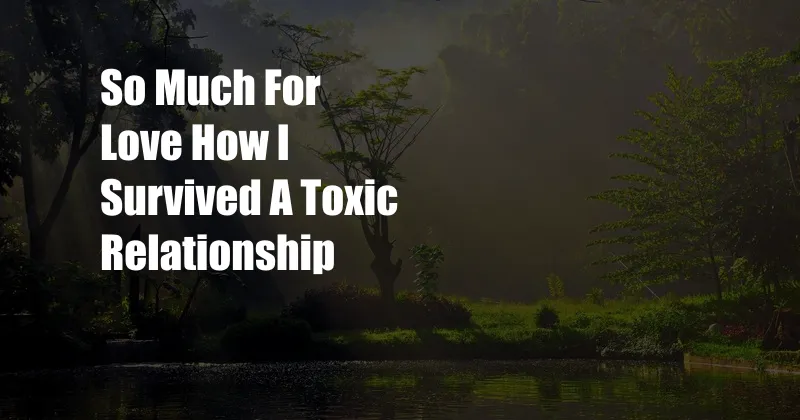
**So Much for Love: How I Survived a Toxic Relationship**
My heart pounded in my chest as I listened to his words. “You’re worthless,” he hissed. “You’ll never find anyone better than me.” Tears streamed down my face as I realized the love I had thought was so strong was actually suffocating me.
I had fallen into a toxic relationship without even realizing it. The initial sparks of romance had quickly turned into a cycle of abuse, manipulation, and isolation. It took me months to break free from his clutches, but I finally found the strength to leave and rebuild my life.
**Understanding Emotional Abuse**
Emotional abuse is a form of psychological violence that can be just as damaging as physical abuse. It involves patterns of behavior that are designed to erode a person’s self-esteem, sense of identity, and overall well-being.
Tactics of emotional abuse include:
- Verbal insults and belittling
- Gaslighting (manipulating reality to make you doubt your own perception)
- Isolation from friends and family
- Financial control
- Sexual coercion
**The Cycle of Abuse**
Toxic relationships often follow a predictable cycle of abuse:
- Tension building: The abuser’s behavior becomes increasingly critical and volatile.
- Violent outburst: The abuser explodes, expressing their anger and hostility through verbal or physical attacks.
- Honeymoon phase: The abuser apologizes and promises to change, drawing you back into the relationship.
- Calm: The relationship returns to a superficial sense of normalcy, but the tension slowly begins to build again.
**The Impact of Toxic Relationships**
Toxic relationships can have devastating effects on physical, mental, and emotional health:
- Physical: Insomnia, headaches, digestive issues
- Mental: Anxiety, depression, PTSD
- Emotional: Loss of self-esteem, feelings of worthlessness, isolation
**Tips for Surviving and Thriving**
Breaking free from a toxic relationship is not easy, but it is possible. Here are some tips for surviving and thriving:
- Reach out to trusted friends or family: Confide in someone you trust about the abuse. Their support and perspective can be invaluable.
- Seek professional help: Therapy can provide a safe space to process the trauma and develop coping mechanisms.
- Create boundaries: Set clear limits with the abuser and enforce them. Block their calls, emails, and social media accounts if necessary.
- Prioritize self-care: Engage in activities that bring you joy and rebuild your self-esteem. Spend time with loved ones, pursue hobbies, and take care of your physical and mental health.
- Don’t blame yourself: It’s not your fault that you were in a toxic relationship. Abusers are skilled manipulators and can make you feel like you deserve the abuse.
**FAQ on Toxic Relationships**
Q: Why do people stay in toxic relationships?
A: There are many reasons why people stay in toxic relationships, including fear, guilt, low self-esteem, and a belief that they cannot survive without the abuser.
Q: How can I tell if I’m in a toxic relationship?
A: Some common signs include: feeling like you’re walking on eggshells, being constantly criticized or belittled, and feeling isolated from friends and family.
Q: Can toxic relationships ever change?
A: It is unlikely that a toxic relationship will change without significant intervention. Abusers often have deeply ingrained patterns of behavior that are difficult to break.
**Conclusion**
Surviving a toxic relationship is a testament to your resilience and strength. It is important to remember that you are not alone and that you have the power to rebuild your life. If you or someone you know is in an abusive relationship, please reach out for help. There are resources available to support you.
Are you interested in learning more about toxic relationships? Share your thoughts and experiences in the comments below.